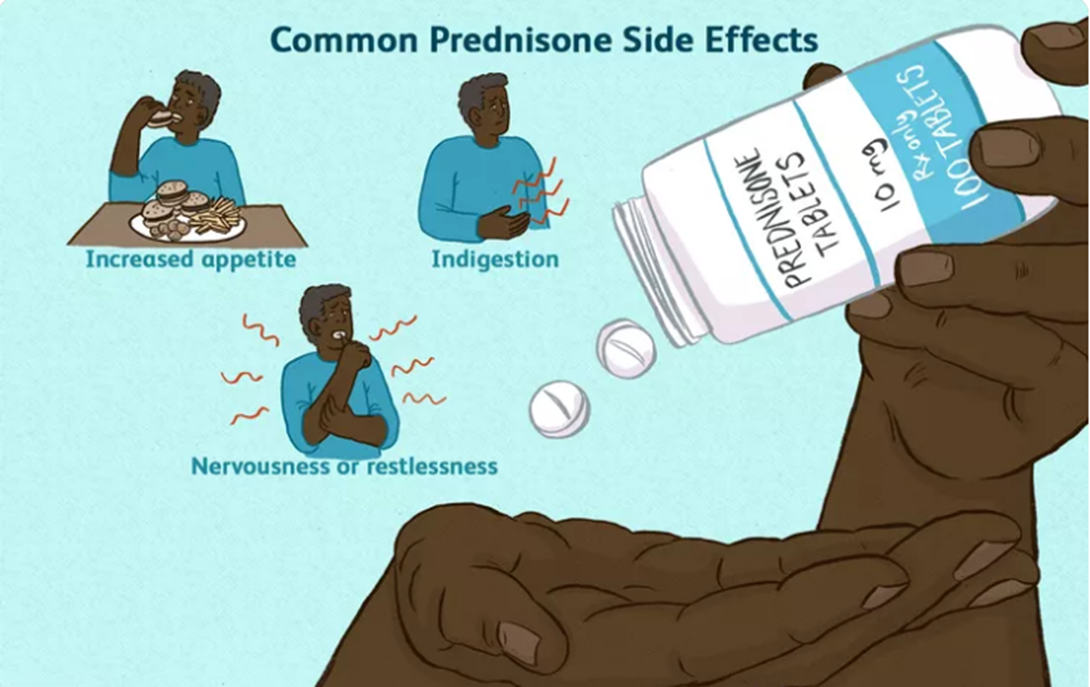A nurse is reviewing the medication list for a client who has a new diagnosis of type 2 diabetes mellitus. The nurse should recognize which of the following medications can cause glucose intolerance?
Dextromethorphan
Prednisone
Atorvastatin
Cimetidine
The Correct Answer is B
Choice A reason: Dextromethorphan is a cough suppressant that does not affect blood glucose levels. It is safe to use for clients with diabetes.
Choice B reason: Prednisone is a corticosteroid that can cause glucose intolerance by increasing glucose production and decreasing insulin sensitivity. It can worsen hyperglycemia and increase the risk of diabetic complications.
Choice C reason: Atorvastatin is a statin that lowers cholesterol levels and reduces the risk of cardiovascular disease. It does not cause glucose intolerance and may have a beneficial effect on glycemic control.
Choice D reason: Cimetidine is a histamine-2 receptor antagonist that reduces stomach acid production and treats ulcers and gastroesophageal reflux disease. It does not cause glucose intolerance and has no significant interaction with diabetes medications.

Nursing Test Bank
Naxlex Comprehensive Predictor Exams
Related Questions
Correct Answer is C
Explanation
Choice A reason: This is incorrect because nausea is not a common or serious adverse effect of estrogen therapy. However, the patient should take the estrogen with food or milk to prevent stomach upset.
Choice B reason: This is incorrect because triglycerides are not affected by estrogen therapy. However, the patient should monitor their cholesterol and blood pressure levels regularly and follow a healthy diet and exercise regimen.
Choice C reason: This is correct because smoking and estrogen therapy are both risk factors for thrombosis, which is the formation of blood clots in the blood vessels. The patient should stop smoking and report any signs of thrombosis, such as leg pain, swelling, redness, or warmth, to the provider.
Choice D reason: This is incorrect because bleeding during menstruation is not increased by estrogen therapy. However, the patient should report any abnormal vaginal bleeding, such as spotting, heavy bleeding, or prolonged bleeding, to the provider.
Correct Answer is A
Explanation
Choice A reason: Taking the bronchodilator inhaler first will help to open up the airways and make it easier for the corticosteroid inhaler to reach the lungs and reduce inflammation. This will improve the effectiveness and safety of the inhalers.
Choice B reason: Taking the corticosteroid inhaler first may not be as effective as taking the bronchodilator inhaler first, because the airways may be constricted and prevent the corticosteroid from reaching the lungs. This may reduce the anti-inflammatory effect of the corticosteroid and increase the risk of side effects.
Choice C reason: Taking these two drugs at least 2 hours apart is not necessary and may not be practical for the patient. The bronchodilator and the corticosteroid can be taken together, as long as the bronchodilator is taken first.
Choice D reason: It does matter which inhaler the patient uses first, because the order of the inhalers can affect their efficacy and safety. The patient should always use the bronchodilator inhaler first, followed by the corticosteroid inhaler.
Whether you are a student looking to ace your exams or a practicing nurse seeking to enhance your expertise , our nursing education contents will empower you with the confidence and competence to make a difference in the lives of patients and become a respected leader in the healthcare field.
Visit Naxlex, invest in your future and unlock endless possibilities with our unparalleled nursing education contents today
Report Wrong Answer on the Current Question
Do you disagree with the answer? If yes, what is your expected answer? Explain.
Kindly be descriptive with the issue you are facing.
